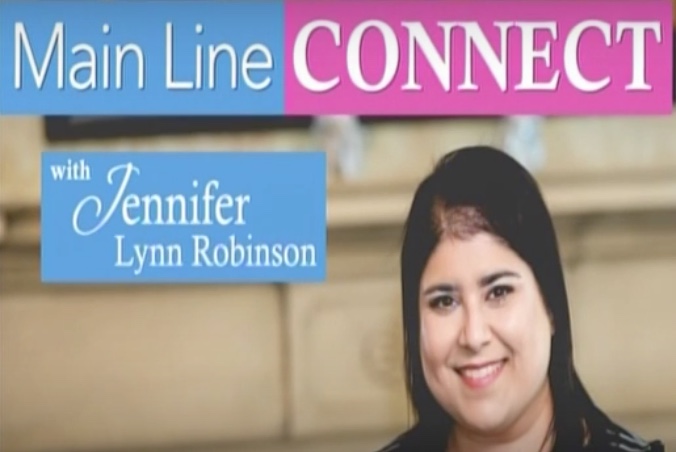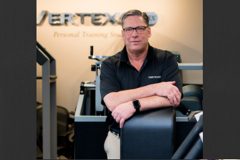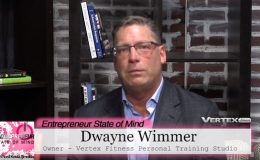Main Line Connect with Jennifer Lynn Robinson and Guest Dwayne Wimmer
In this episode of Main Line Connect with Jennifer Lynn Robinson, Jennifer interviews Dwayne Wimmer the owner of Vertex Fitness Personal Training Studio and the President/CEO & Founder of The Fitness Leaders Alliance.
I recently had the opportunity to sit down with Jennifer Lynn Robinson of Main Line Connect for an interview. Main Line Connect is a 30 minute weekly TV show that focuses on networking, interviews, and Main Line Happenings. We had a great conversation about the business side of Vertex Fitness and how important it is for me to be out and about in the community, but we also discussed the personal side of what I do.
What I’ve found in my years of personal training is that having certifications is not enough. Having technical knowledge of the latest fitness technique is not enough. Even having a large following is not enough. You have to understand the bigger picture as a personal trainer. Not only do I have to connect with my clients to keep them motivated, but I have to keep them coming back, week after week. You could have all the tools in the world, you could be the best trainer in the world, but if you don’t have anybody to train, you’re never going to be successful. To that end, I’m developing my own in-house training program curriculum that covers the protocol, sales and marketing, and customer service, as well success training and goal setting. What I want trainers around the country and globally to understand is that it is a business. As I told Jennifer, it’s sort of like music. You could be a great musician, but if you don’t have a great business behind you, no one’s going to hear your music.
Some trainers think that motivating their clients simply means to get them to work as hard as they possibly can during every single session. While my strength training program does focus on high-intensity and maximum effort workouts, there is an even more important factor than working hard during the session, and that’s consistency. The most successful trainers aren’t the ones who are educating themselves on a regular basis on the newest techniques of training. They’re the ones who can engage and get someone to keep coming in. Consistency is the number one factor as far as getting results. If you can get people to continue doing any type of activity, they’re going to see results, regardless of whether you get them to do that one more rep during a session.
I have found that the same thing is true for trainers as it is for gifted athletes. It’s something that I learned while working with athletes as a strength coach for the Villanova athletics program. The ones who are gifted and who really want to take it to another level will work hard from morning to night. For those unwilling to put that work in, their gift will only take them so far, and that’s where they’ll end.
Right now, I have five clients who have actually started with me before I started Vertex Fitness that are still with me. They’ve been with me now for going on nineteen years. One guy came in to me three months after bypass surgery, and he’s been working out with me three times a week ever since.
This is the soul of why I do what I do—I’m going to keep working at my goals, day in and day out, to grow my business and keep the people of the Main Line healthy.
You can watch the full interview below and/or read the transcript at the bottom of the page.
Please leave a comment below, let me know what you thought of the interview and the content.
I love feedback and would love to hear from you.
Get your copy of Soul of Success, Vol 2, with Jack Canfield featuring Dwayne Wimmer and over 50 other authors.
Request a complimentary first session at Vertex Fitness, Voted the BEST Personal Training Studio on the Main Line
Click HERE and we will schedule a session to try it yourself
Main Line Connect with Jennifer Lynn Robinson and Guest Dwayne Wimmer – Transcript
Jennifer: Welcome to this episode of Main Line Connect. I’m Jennifer Lynn Robinson and my guest today is Dwayne Wimmer, who’s the owner of Vertex Fitness. Welcome, Dwayne.
Dwayne: Thank you for having me.
Jennifer: Thanks for being here! So we always like to start out the show talking about something that has to do with networking or marketing, and as great as Vertex is, it’s one of many facilities in the area that offer physical training and things of that nature. So when you go out to networking or you’re marketing yourself or you’re marketing Vertex, what is kind of the unique value proposition, what’s the 30 second pitch, what distinguishes you guys from the others out there?
Dwayne: Well, it’s really difficult, because everybody says the same thing. What we try to do is to engage someone so that they are having a good conversation with us, like us, and come in for our complimentary session. Our complimentary session are really where people see the difference. We can say that we have more attention to detail, we can say that our workouts are efficient, we can say that they’re safe, but in the end everybody’s saying those things. Not until you come in that you can really see the difference and feel the difference, how detailed it is and how much you can get out of every session so you can be safe and get a better workout in less time.
Jennifer: I think people probably across the board appreciate the ‘less time’ idea, right? Because people don’t want to be in the gym for hours. The idea that you can come in for thirty minutes and get a great workout I’m sure is something that people really gravitate towards.
Dwayne: They do when they understand it, but upfront it’s really a hard sell because they think, “Well I’ve been in the gym for an hour, two hours, for three, four, five days a week and I’ve gotten some results. So how can I possibly get any results in two, maybe three times a week?” So that’s when we say “Come in, let us show you the difference.”
Jennifer: So it’s changing the mindset by actually getting people there. If you can get people there, you can change the mindset.
Dwayne: Definitely. You can’t educate people while you’re networking. To have them come in, touch it, feel it, actually experience it, go home, digest it, and then compare it to what they think they know, and compare it to what they’ve just experienced. Once they do that, then they can have an educated decision on whether or not this will be for them.
Jennifer: So it seems like it would be very important to your business to actually be out there and getting to know new people and getting them to come in for your complimentary session.
Dwayne: We do that all the time. That’s how we met.
Jennifer: [laughs] Right! I mean, I know that probably having staff members that go out to these events is probably a big priority, because you can’t be everywhere.
Dwayne: Right. We’ve been a member of the Chamber of Commerce for fifteen years, and we go to different networking events. I know the Upper Main Line Connections, or something like that, they have an event that we go to on a regular basis. We also are involved with the Ultimate Networking Group, we actually help run the Main Line chapter of that. You know, we’ve been out networking for years and I know for a long time that the face to face is how you really get to know people and how you get new clients.
Jennifer: And I’ve known you for about five years now and you’re definitely out there networking all the time so I give you credit. So tell me about, as far as physical fitness, is it something you’ve been interested in your whole life? Or is it something you developed a liking for?
Dwayne: Well, when I was in high school, my favorite classes were lunch, study hall, and gym. I always played sports, so when I went to college mainly to play football, I was trying to find something I would enjoy and something I could make a livelihood at, so I went to school to become a Phys Ed teacher, because that’s what I liked. I realized that dealing with kids was probably not the best thing for me and I really wanted to be a coach as well. I went to grad school, was a grad assistant football coach. But in between I had an experience working at a health club, and realized I could take the education that I was taught through the process of learning to be a teacher, and apply it to a captive audience, a student who wanted to learn at a health club. So that’s sort of how I fell into become a personal trainer. Now I’ve taken that whole process and I’ve become a student of the exercise that I’ve prescribed, and now I’m teaching others how to take this exercise and apply it to the general population to help people with their exercise programs.
Jennifer: Right, right. So I know that at the beginning you used to coach athletes at Villanova, I think Brian Westbrook is one of the people that you worked with, right? So that’s exciting, I guess before he was big time Eagles Brian Westbrook. What is different, if anything, between coaching elite athletes or people who are trying to be elite athletes as opposed to the rest of us who are just trying to stay in shape or lose a few pounds?
Dwayne: Well, you know, contrary to what most people believe, elite athletes are elite athletes because they are genetically gifted. When I was at Villanova it was sort of in the middle of my career, I had already started at health clubs and had a taste of training the general population and thought I wanted to take that to another level and train athletes. Villanova uses the same type of protocol that I use as far as strength training goes. I got there and I quickly realized that the gifted athletes were always the gifted athletes and they never had to work very hard to get to where they were. So when it came to working out, and this is not across the board, Brian Westbrook was a totally different animal when it came to this, but the gifted athletes were a lot of times the ones who were the lazy athletes in the weight room, they didn’t want to work hard. Where I loved training the walk-ons. The walk-ons were the ones who were there because they wanted to be there, and there because they wanted to be a part of the team, and who wanted to prove themselves. And then, going back to Brian Westbrook, he was a gifted athlete who also worked really hard both in practice and in the weight room. So, after I was at Villanova for a while, I had been personal training on the side and had built a client base and had to make a decision whether I wanted to stay in the athletic arena or go back to dealing with the private sector. I realized that the average person hasn’t been that gifted athlete. The physical aspect of things have not been handed to them by God or their parents in the genetic field. Most of them have never done this before, and they’re a clean slate. You can teach them and mold them and take them to places they never thought they could go.
Jennifer: As far as the elite athletes we’re talking about, do you think, is it difficult to enforce to them that strength training is so important? Is it more like a basketball player, for example, the basketball moves that they have to learn versus strength training to help them improve their physique and their core strength and all that, is it sometimes very hard to show them the importance of that, because they don’t have the buy in?
Dwayne: Um, I think the ones who really really want to take it to another level get it, like the Brian Westbrooks, and you talk about basketball, there was a basketball player who stands out in my mind when I was at Villanova, Malik Allen played for years in the NBA as the first man, second man off the bench. He worked really really hard in the weight room, and worked hard on the court. I think there’s a separation from the ones who are really going to take it to another level to those who are, this is the end, is really where you see the difference. The ones who are gifted who really want to take it to another level will work hard from morning to night. Where the other ones, their gift will only take them so far and that’s where they’ll end.
Jennifer: You can really say that about anybody in life, it’s not just athletes. I mean, I’m the oldest of three sisters, my youngest sister is who we would call the Brainiac of the family, and she’s never really had to try hard, you know? But at some point that runs out and you get to things like, how hard are you willing to work? How good are you at marketing? Or whatever it is that you’re trying to do. Not anything against my sister, but anything in life, I think that applies. Your gift can only take you so far, and how hard are you willing to work for the rest of it? With the athletes, are they willing to do the running and the strength training? To improve their physique, maybe they’re going to do yoga or Pilates or whatever it is that has nothing to do with their sport but it’s just helping them improve their physical capacity and their mental capacity probably. And some people are willing to do it and I guess others are not.
Dwayne: And you know the thing, the bigger picture, especially with athletes and it goes to the general population as well, if you do a well-designed program like we do at Vertex Fitness, you’re going to strengthen your total body, you’re going to strengthen your joints to where they become more stable units, and the chance of hurting yourself in everyday life or in athletes case on the field, it minimizes. It’s not that you’re never going to get hurt, excess force or excess use can create injury, but if you take your body and you create a more stable unit, the chances of hurting yourself in everyday life or in your sport will be minimized.
Jennifer: Yeah. And that’s definitely an important point that you bring up, for everybody. So, at some point you decided to start Vertex, and when was that?
Dwayne: We started in 2001. I had been working as a subcontractor, and realized that I had ideas and I had ways that I wanted to do things that weren’t being implemented where I was. Being a subcontractor, it’s your own business within another business and I didn’t have much as far as helping the business itself grow. I could grow myself to a certain level, but I was limited, and I saw a bigger picture. That’s really what keeps driving me today. I see a vision of what this could be. I had a vision of opening my own studio long before I opened Vertex, about five or six years before that I wrote a business plan, got a loan, but it just didn’t feel quite right so I didn’t do it then. I moved forward doing some other things and then the timing was right. I opened Vertex Fitness in 2001.
Jennifer: In the same location you’re in now in Bryn Mawr or in another place?
Dwayne: In Bryn Mawr but just around the corner, we were on North Merion Avenue. The building is no longer there, the new development where Bauch and Lomb and Athleta is now, took over the space where I was before. So we just moved around the corner, we’re above the clothing store Skirt.
Jennifer: Sure. It’s a nice location.
Dwayne: We’ve been in Bryn Mawr since 2001, just a couple hundred yards around the corner when we moved in 2012.
Jennifer: How hard is it to decide where geographically your business should open?
Dwayne: That’s interesting, because I had never been to the Main Line. I worked at a health club up in Gilbertsville. We came down to visit Main Line health and fitness because they were doing a lot of the same things we were doing, and driving through the area it didn’t take me long to figure out that this demographic was where I wanted to open a business. Based on just looking at the houses and the cars people drive compared to Gilbertsville, there’s a huge difference. For a personal training studio, you have to look at those things. The density of the population as well as the income. And at that time, personal training was not what it is today. We were one of the first to come into the area in 2001.
Jennifer: Have you had clients who have been with you since the beginning?
Dwayne: I have five clients who have actually started with me before I was a subcontractor, that are still with me. They’ve been with me now for going on nineteen years.
Jennifer: Wow. That must be really rewarding.
Dwayne: Yeah. And I talk about it all the time, the one guy came in to me three months after bypass surgery, and he’s been working out with me three times a week ever since.
Jennifer: Wow. That’s great. And I know you’re also a part of something called the Fitness Leaders Alliance. Tell me what that is.
Dwayne: The Fitness Leaders Alliance is something that I started with a couple partners because of the struggle in our industry to find good staff. That has always been my struggle. You can find people who have certifications, you can find people who have a following, but it’s really difficult to find people who understand the bigger picture as far as a personal trainer. A personal trainer has to connect with your clients, but also, like we said earlier, you have to be able to get a client. You could have all the tools in the world, you could be the best trainer in the world, but if you don’t have anybody to train, you’re never going to be successful. You can bring in a lot of people, but you need the tools to keep them coming in. So we at Vertex developed this in-house training program that takes care of our protocol, sales and marketing, customer service, and we also teach them about success training, goal setting, about how to become successful. So, the Fitness Leaders Alliance is taking that curriculum that we’re developing and taking it to another level. So, we want to help personal trainers and people in the fitness industry across the country and actually globally to become successful fitness entrepreneurs or fitness business people. Where most people in the fitness industry don’t understand that it is a business. It’s sort of like music. You could be a great musician, but if you don’t have a great business behind you, no one’s going to hear your music.
Jennifer: And I would think that working one-on-one with people too you also need great people skills. And there are probably some that are technically great trainers but aren’t “people-people”.
Dwayne: Then the question is are they really wonderful trainers, then. Because the part of it is is getting people to continue. If you go to a health club, and you look at the trainers who have the most clients, they probably aren’t the ones who have the most technical skills. They aren’t the ones who are educating themselves on a regular basis on the newest techniques of training. They’re the ones who can engage and get someone to keep coming in. Consistency is going to dominate over everything as far as getting results. If you can get people to continue doing any type of activity, they’re going to start seeing results.
Jennifer: That’s a very important component. And I’m sure that’s something you cover in your training that you were talking about.
Dwayne: All the time.
Jennifer: And then you also do a podcast. The podcast is called the Fitness Professionals’ Show. How often do you do that?
Dwayne: We were doing it monthly. As you know, doing a show like this takes a lot. And I was the one doing the editing and all that. What we have done though is we have interviewed some of my favorite people in the fitness industry and asked them questions on the industry and how it’s different in the years since they’ve started it, and where they think it’s going. It’s a really interesting part of what I’ve done. I want to get back to that, but there’s only so many hours in the day, and paying the bills right now is Vertex.
Jennifer: And of course, you did this great book that we’re going to talk about, “The Soul of Success, Vol. 2”, which you’re a part of, and your face is on the cover here, just want to make sure everybody sees that. I know that this came out last year, correct?
Dwayne: Yes. And it is a bestselling book, so now I’m a bestselling author.
Jennifer: Congratulations. So tell us about the book!
Dwayne: Well, it’s a collaboration of different authors and different topics headed by Jack Canfield of the Chicken Soup for the Soul franchise. I was contacted by my publisher, and he asked me if I wanted to be a part of this. After asking a couple questions it was really a no-brainer. Everybody knows Jack Canfield, and what I got to do through this whole experience was this, I actually got to sit down with Jack Canfield and have an interview with him, I have that on video, and because the book became a best seller, and I got a Quilly award which is a best selling author award, I got to experience this whole thing out in Hollywood at the Roosevelt Hotel where we got our awards and I was there with all the other best-selling authors, and I got to interview with Jack Canfield, and it was a whole red carpet thing, and at the Roosevelt hotel is where the first Oscars were, so it was just so amazing. It was really cool.
Jennifer: And the book has been a huge success, it sounds like.
Dwayne: Yeah, and I have a few copies, if anyone comes in for a complimentary session and mentions this show, I will give them a copy of the book.
Jennifer: Wow, is everyone listening to that? Come in for a complimentary session and get a complimentary book. That’s great. So let’s get back to some of the stuff with fitness, some of the misconceptions. Some people say “You don’t have to exercise, you just have to eat the right foods”. And other people say the opposite, “You have to exercise but you don’t have to eat the right foods”. I’m sure you’re going to tell me it’s some combination of both, but what’s your philosophy on that? Is there one that’s more important than the other? Is diet more important than fitness? Or vice-versa?
Dwayne: First you have to ask what is your goal. If you are strictly looking to lose body fat, you’ve got to eat differently. It’s that simple. Exercise is really, really good for you. It changes your body on so many levels, and it depends on what you’re doing. What we focus on is strength training. Strength training changes your body quicker than anything else that you can do for your body internally. But as far as losing body fat goes, it doesn’t burn many calories. No exercise burns many calories. It burns a few extra calories, but it’s not gonna spend enough calories to make that big of a difference if you’re doing it efficiently and effectively. Now you can go out and do lots of work, and it’ll spend more calories, but it’s just work, it’s not exercise. And then we get into definitions, and what is exercise. Exercise is simply an overload to create a change or a stimulus for your body to change. Movement is really good for you. You can move around and do a lot of things, but it’s not going to change your body all that much. And then when you get into things like sports, it may overload your body a little bit, but over time you get better at the sport and it becomes less and less exercise. Exercise is a continuous process that takes you closer and closer to your genetic potential. Most people can’t think to that level. They think if it’s hard, it’s exercise. No, not necessarily, because it could be hard, but not hard enough to create change. There’s three components, here. There’s fitness, there’s health, and there’s exercise. Health is the state of your body, living without disease, and being able to do things.
Jennifer: And I think that’s where a lot of us are. You look at people who have a good quality of life versus the opposite of that, and you think at the minimum I want to be able to get around. I want to be able to travel. I don’t want to be bedridden. Exercise is a component of that.
Dwayne: Well, you’ve got health, and then you’ve got fitness. Fitness is basically the measure of your ability to do things. Your fitness level of something. And then you’ve got exercise, which is something that should increase both, but not at the cost of either one. So if you exercise, but you hurt yourself, you’re costing your health for the ability to do more work. So the chance of injury should be also weighed into your exercise program. That’s why, on our program, we try to keep the forces on your body low, but they need to be high enough to be able to cause a stimulus but not high enough that they can cause an injury. And then the repetitions, how many times you’re doing things, shouldn’t be really high either, because you can actually create injury by doing to omany of any one thing.
Jennifer: A repetitive stress injury.
Dwayne: Exactly.
Jennifer: So when you have people come in, and I’m sure you and your staff, I know for a fact, I’ve been there, are very motivating. But sometimes people are just having an off day, they come in but they really don’t want to be there, they’re not motivated, what do you guys do to try to turn things around?
Dwayne: We try to get them focused on why they’re there in the first place, maybe not today, but the bigger picture. When you can see down the road, you can see that this is just one little step in the journey, and you can give it 100 percent of whatever you have for today. That will be a part of the process. Now, you may not have as much as you have other days. You may not have eaten as well, you may not have slept as well, you may have had a bad day or a good day or whatever causes it. But what we try to do is to try to get you to focus on what we are doing for the moment, and get as much from that as you possibly can. And honestly, over time, people always say to me when they leave, “Thank you, because that is much better than what I thought I could do today.”
Jennifer: Yeah. And I feel like working out is one of those things, I mean most of us don’t like it the way you do. But once you’re done, you’re always happy you did it. You know? If you can get yourself there and complete the workout, you feel better physically, you feel better mentally, you’re happy that you completed it.
Dwayne: I tell people to think of exercise not as a chore, but sort of like brushing your teeth. It’s just part of a process, part of the day, part of your healthy wellbeing, put the time in, put the effort into it, but then forget about it until it’s time to do it again. If you can take that approach to it, I think more people will do it on a more regular basis, and I go back to the consistency thing. Consistency is a bigger piece of the pie than how hard you work every time. If you can get in there and do it on those days that you really don’t feel like doing it, it becomes a habit, it becomes part of your routine, and once that happens, you’re going to start seeing the results, and it takes time.
Jennifer: Yeah. So when people do come in, and sometimes you mentioned you haven’t eaten well or you haven’t slept well, or whatever it is, what do you recommend for people before they’re coming in, for people who say you shouldn’t eat before you work out, or you should eat a huge meal, or you should have a protein shake or a banana. What is the best thing for people to eat before they come work out?
Dwayne: Well, it really depends on what you’re going to be doing. If you aren’t going to be working that hard, it really doesn’t matter too much. We try to get people to work to their maximum effort. You cannot put a lot of effort into a program if you’re not fueled. That being said, if you put too much energy into your body right before you start, it’s in your digestive system, not readily available. So, something with a complex carbohydrate, about an hour and a half before. One of the things that most of our clients have found works really well is an oatmeal, about an hour and a half before they work out. It’s in your system, it’s not like drinking a juice where it’s in and out of your system real quick, it gets into your system, it’s able to be used in about an hour and a half when you need it, but then after you work out you probably want to eat a little more carbohydrates with some protein.
Jennifer: Yeah. You don’t want to come in starving to a workout.
Dwayne: You won’t make it through our workouts. Seriously. Your blood sugar will drop, and you just can’t get through it, because the intensity level is high. You know, when people first come through, obviously they don’t know how to work that hard, so it’s a slow process to get them to that intensity level. But, once they start doing that and they start feeling that, they start feeling that they need to fuel their body for that workout.
Jennifer: Yeah. You have to plan for it. So tell us what’s coming up, we’re almost at the end of the year, what’s coming up in 2017 for Vertex, what do you have in the works?
Dwayne: Well, we keep trying to grow. I’m always looking for good trainers. We’re growing every day, we get new clients wanting to come in. So, I’m looking for trainers, we’re growing the staff, that internal program I explained about earlier, we’re continuing to develop that and eventually that’ll be something that we market to the industry. Right now it’s an in-house training process. So, we’re just trying to keeping growing and keeping people healthy on the Main Line.
Jennifer: I know that one of the things that’s important to you is to do a lot of community work, and I’ve noticed on social media, let’s say in the last year, that people are doing these non-profit name check-ins. Tell me what that’s about.
Dwayne: We do a program called Sweat Angels. So, when you come in to work out, you check in on Facebook and you say “I’m here at Vertex for my training session, maybe you take a picture of your workout or something, and you post it with the hashtag of the month. This month, in December, is #booksforkids, last month it was #movember. So, every month there’s a different charity, and then for every check-in it goes towards something. I think fifteen check-ins gets a book for a kid. Every month is something different. It’s really interesting to see how different people really get involved in this.
Jennifer: That’s wonderful. I want to make sure people know how to reach you, so tell everybody your website and your contact information.
Dwayne: www.VertexFit.com is the website, and they can always call us at 610.525.6604, or they can email me and they can just do info@vertexfit.com. They can schedule their complimentary session on the website, there’s a link to a complimentary session and we’ll get you scheduled.
Jennifer: Okay, well thank you so much for being here today, and we’ll see you next time!
Request a complimentary first session at Vertex Fitness, Voted the BEST Personal Training Studio on the Main Line
Click HERE and we will schedule a session to try it yourself









Leave a Comment